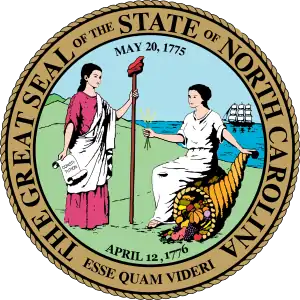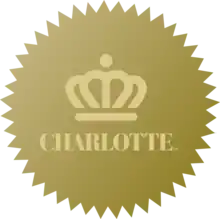Timeline of Charlotte, North Carolina
The following is a timeline of the history of Charlotte, North Carolina, United States.
Prior to 19th century
Part of a series on the |
|---|
| History of North Carolina |
 |
|
|
- 1763 – Mecklenburg County established.[1]
- 1768 – Charlotte Town incorporated.
- 1770 – Queen's Museum chartered.[2]
- 1774 – Charlotte becomes capital of county.[3]
- 1775 – Mecklenburg Resolves signed.
- 1777 – Liberty Hall Academy incorporated.[3]
- 1780 – Battle of Charlotte fought.
19th century
- 1835 – Charlotte Journal newspaper begins publication.[4]
- 1837 – Charlotte Mint opens.
- 1850 – William F. Davidson becomes mayor.
- 1852
- 1857
- Charlotte Female Institute established.[2]
- YMCA becomes active.[6]
- Gas lighting in use.[3]
- 1858 – Charlotte Military Academy established.[3]
- 1867 – Biddle Memorial Institute founded.
- 1875 – Charlotte public schools established.[7]
- 1880 – Population: 7,084.
- 1886 – Charlotte Chronicle newspaper begins publication.[4][8]
- 1887
- Electric lighting in use.[3]
- Charlotte Fire Department founded.
- 1888 – The Charlotte News begins publication.[4]
- 1890 – Charlotte Post newspaper begins publication.[9]
- 1891
- 1897 – Elizabeth College established.[11]
20th century
- 1903 – Charlotte Carnegie Public Library opens.[12]
- 1905
- Brevard Street Library for Negroes opens.
- Southern Power Company incorporated.[13]
- 1908 – Union National Bank founded.
- 1915 – Temple Israel built.
- 1921 – WBT radio begins broadcasting.[14]
- 1924
- Hotel Charlotte opens.
- Radiator Specialty Company founded.
- 1930 – Population: 82,675.
- 1932 – Charlotte Symphony Orchestra formed.
- 1933 – WSOC radio begins broadcasting.[14]
- 1935 – Charlotte Municipal Airport established.
- 1936 – Mint Museum opens.
- 1940 – Population: 100,899.[15]
- 1946 – Charlotte Center of the University of North Carolina opens.
- 1947 – The Unitarian Universalist Church of Charlotte founded.
- 1949 – WBTV (television) begins broadcasting.[16]
- 1950 – Population: 134,042.[15]
- 1955 – Ovens Auditorium opens.
- 1957
- WSOC-TV (television) begins broadcasting.[16]
- American Commercial Bank formed.
- 1960 – Population: 201,564.[15]
- 1961 – Stan Brookshire becomes mayor.[5]
- 1966 – Charlotte Botanical Gardens established.[17]
- 1967 – WCNC-TV begins broadcasting.
- 1968 – Bartlett Tree Research Laboratories Arboretum established.[18]
- 1970
- SouthPark Mall opens.
- Population: 241,178.[15]
- 1971 – U.S. Supreme Court decides Swann v. Charlotte-Mecklenburg Board of Education, approving racial desegregation busing.[5]
- 1973 – Carowinds Monorail begins operating.
- 1974 – Airplane accident.
- 1976 – Afro-American Cultural Center established.[19][20]
- 1980 – Population: 314,447.[15]
- 1982 – Heroes Convention (comic books) begins.
- 1983 – Harvey Gantt becomes mayor.[5]
- 1985 – Metrolina Theatre Association established.
- 1986
- Opera Carolina formed.
- Airplane accident.
- 1987 – WJZY begins broadcasting.
- 1988
- Charlotte Hornets begins play.
- Charlotte Knights franchise established.
- 1989 – Hurricane Hugo.
- 1990 — Population: 395,934.[15]
- 1991
- Blockbuster Pavilion opens.
- Museum of the New South incorporated.
- 1992
- 1993
- City government computer network begins operating.[21]
- Mel Watt becomes U.S. representative for North Carolina's 12th congressional district.[22]
- 1994
- WMYT-TV begins broadcasting.
- Airplane accident.
- Charlotte's Web Community Network online.[23]
- 1995
- Pat McCrory becomes mayor.
- Charlotte Convention Center and Tremont Music Hall open.
- City website online.[24][25]
- Carolina Panthers began play as first NFL team in the Carolinas
- 1997 – Loomis Fargo Bank Robbery.
- 1998 – Bank of America formed.
- 1999 – Federal court ends mandated racial integration in schools via busing.[26]
21st century
2000s
- 2000 – Population: 540,828.
- 2002 – ConCarolinas begins.
- 2003 – Airplane accident.
- 2004
- Slow Food Charlotte founded.[27]
- Street Soccer USA headquartered in city.[28]
- 2005 – Charlotte Bobcats Arena and ImaginOn open.
- 2007
- Lynx Blue Line light rail begins operating.
- Billy Graham Library opens.
- 2009 – Anthony Foxx becomes mayor.[29]
2010s
- 2010
- NASCAR Hall of Fame and Bechtler Museum of Modern Art open.
- Population: 731,424.
- 2011 – Occupy Charlotte begins.
- 2012
- Little Sugar Creek Greenway built.
- Democratic National Convention held in Charlotte.
- 2013
- Robert Pittenger becomes U.S. representative for North Carolina's 9th congressional district.[30]
- Population: 792,862.[31]
- 2014 – Alma Adams becomes U.S. representative for North Carolina's 12th congressional district.[32]
- 2015 – Population: 827,121 (estimate).[33]
- 2016 – September: Protests and unrest following the shooting of Keith Lamont Scott leave several police officers wounded, and a civilian shot.[34]
See also
- History of Charlotte
- Mayor of Charlotte, North Carolina (list)
- List of Charlotte neighborhoods
- National Register of Historic Places listings in Mecklenburg County, North Carolina
- List of tallest buildings in Charlotte
- Timelines of other cities in North Carolina: Asheville, Durham, Fayetteville, Greensboro, Raleigh, Wilmington, Winston-Salem
References
- Scholl Center for American History and Culture. "North Carolina: Individual County Chronologies". Atlas of Historical County Boundaries. Chicago: Newberry Library. Retrieved May 30, 2015.
- Charles Lee Raper (1898), The church and private schools of North Carolina, Greensboro, N.C: J.J.Stone, printer, OL 7177437M
- Tompkins 1903.
- "US Newspaper Directory". Chronicling America. Washington DC: Library of Congress. Retrieved August 28, 2012.
- Maddison 2007.
- Stephen Beauregard Weeks (1888), A history of YMCA's movement in North Carolina, 1857–1888, Raleigh, N.C: Observer Printing Company, OCLC 13253321, OL 22882813M
- Biennial Report of the Superintendent of Public Instruction of North Carolina. 1898
- "About The Charlotte Observer". Archived from the original on June 12, 2012. Retrieved August 28, 2012.
- "African American newspapers in North Carolina". Research Guides for North Carolina. University of North Carolina at Chapel Hill Libraries. Retrieved May 30, 2015.
- Laws and resolutions of the State of North Carolina. 1891
- American College and Private School Directory. 1914
- American Library Annual, 1917–1918. New York: R.R. Bowker Co. 1918. hdl:2027/mdp.39015013751220.
- Walsh 1907.
- Jack Alicoate, ed. (1939), "Standard Broadcasting Stations of the United States: North Carolina", Radio Annual, New York: Radio Daily, OCLC 2459636
- Population of the 100 Largest Cities and Other Urban Places in the United States: 1790 to 1990, US Census Bureau, 1998
- Charles A. Alicoate, ed. (1960), "Television Stations: North Carolina", Radio Annual and Television Year Book, New York: Radio Daily Corp., OCLC 10512206
- "Botanical Gardens History and Mission". Archived from the original on May 16, 2012. Retrieved August 28, 2012.
- "Garden Search: United States of America: North Carolina". London: Botanic Gardens Conservation International. Retrieved May 30, 2015.
- American Association for State and Local History (2002). Directory of Historical Organizations in the United States and Canada. ISBN 0-7591-0002-0.
- "Timeline of Our History". Charlotte NC: Gantt Center for African-American Arts+Culture. Retrieved May 30, 2015.
- "NII Awards 1995". USA: National Information Infrastructure Awards. Archived from the original on January 1997.
- "North Carolina". Official Congressional Directory. Washington, D.C.: Government Printing Office. 1993. hdl:2027/uc1.l0099748295 – via HathiTrust.
- Steve Snow (ed.). "Charlotte's Web". Archived from the original on February 1998.
- Patricia A. Langelier (1996). "Local Government Home Pages". Popular Government. University of North Carolina at Chapel Hill. 6 (3): 38+. ISSN 0032-4515.
Special Series: Local Government on the Internet
- "Charlotte-Mecklenburg Home Page". Archived from the original on December 1998 – via Internet Archive, Wayback Machine.
- "By Court Order, Busing Ends Where It Began", New York Times, September 11, 1999
- "Featured Guides: City: Charlotte". Eat Well Guide. New York: Grace Communication Foundation. Archived from the original on March 16, 2015. Retrieved May 30, 2015.
- Tina Rosenberg (October 9, 2014), "In This World Cup, the Goal is a Better Life", New York Times
- "Meet the Mayors". Washington, DC: United States Conference of Mayors. Archived from the original on June 27, 2008. Retrieved March 30, 2013.
- "North Carolina". Official Congressional Directory. Washington, D.C.: Government Printing Office. 2013. hdl:2027/msu.31293033541552.
- "The 15 Cities with the Largest Numeric Increase from July 1, 2012 to July 1, 2013" (PDF). US Census Bureau. 2014.
Vintage 2013 Population Estimates
- Civic Impulse, LLC. "Members of Congress". GovTrack. Washington, D.C. Retrieved September 22, 2016.
- Joe Germuska (ed.). "Charlotte, NC". Censusreporter.org. USA. Retrieved May 3, 2017.
- "State of emergency declared in US city", BBC News, September 22, 2016
Bibliography
- Published in 19th century
- Chataigne's Charlotte Business Directory 1875–76, J.H. Chataigne, 1875
- Published in 20th century
- Daniel Augustus Tompkins (1903), History of Mecklenburg County and the city of Charlotte, from 1740 to 1903, Charlotte, N.C: Observer Print. House, OL 23304731M
- Walsh's Charlotte, North Carolina City Directory, Charleston, S.C.: Walsh Directory Co., 1907
- Charlotte, North Carolina city directory: 1911, Asheville, N.C: Piedmont Directory Co., 1911, OL 13510683M
- Charlotte, North Carolina city directory: 1925, Asheville, N.C: Miller Press, 1925
- Miller's Charlotte, North Carolina city directory: 1931, Detroit: Piedmont Directory Co., 1931
- Federal Writers’ Project (1939). "Charlotte". North Carolina: A Guide to the Old North State. American Guide Series. p. 158+ – via Internet Archive. + Chronology
- George Thomas Kurian (1994), "Charlotte, North Carolina", World Encyclopedia of Cities, 1: North America, Santa Barbara, Calif.: ABC-CLIO (fulltext via Open Library)
- Thomas W. Hanchett (1998). Sorting Out the New South City: Race, Class, and Urban Development in Charlotte, 1875–1975. University of North Carolina Press. ISBN 978-0-8078-4677-3.
- "The South: North Carolina: Charlotte", USA, Let's Go, New York: St. Martin's Press, 1999, OL 24937240M
- Published in 21st century
- Vermelle Diamond Ely; Grace Hoey Drain; Amy Rogers (2001). Charlotte, North Carolina. Black America. Charleston, South Carolina: Arcadia.
- Catherine Maddison (2007). "Charlotte, North Carolina". In David Goldfield (ed.). Encyclopedia of American Urban History. Sage. pp. 134–136. ISBN 978-1-4522-6553-7.
- Hunter Bacot (2012), "Civic culture as a policy premise: appraising Charlotte's civic culture", in Laura A. Reese and Raymond A. Rosenfeld (ed.), Comparative Civic Culture: the Role of Local Culture in Urban Policy-Making, Burlington, VT: Ashgate, ISBN 978-1-4094-3654-6
- Raj Chetty; Nathaniel Hendren (2015), City Rankings, Commuting Zones: Causal Effects of the 100 Largest Commuting Zones on Household Income in Adulthood, Equality of Opportunity Project, Harvard University, archived from the original on 2015-05-06,
Rank #97: Charlotte, North Carolina
External links
| Wikimedia Commons has media related to Charlotte, North Carolina. |
- "History Timeline". The Charlotte – Mecklenburg Story. Public Library of Charlotte & Mecklenburg County.
- Items related to Charlotte, various dates (via Digital Public Library of America)
- Humanities and Social Sciences Division. "Resources for Local History and Genealogy by State: North Carolina". Bibliographies and Guides. Washington DC: Library of Congress.
This article is issued from Wikipedia. The text is licensed under Creative Commons - Attribution - Sharealike. Additional terms may apply for the media files.
